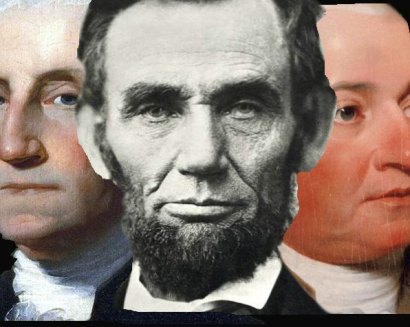Today's Post:
Integrity and the presidential equation

George Washington, Abraham Lincoln and John Adams.
Images: Presidential portraits.
Only a small percentage of registered voters "checked the box" next to positive phrases describing the two candidates, according to a recent Pew Research Center survey.
For example, 18 percent of voters checked “someone you admire” when asked about Clinton, a former first lady, senator and secretary of state who is the presumptive Democratic nominee for the presidency. Even fewer – 10 percent – checked that they admire Trump, an entrepreneur well-known for The Apprentice television show and the presumptive Republican nominee. When asked about honesty, only 13 percent checked the box for Clinton, while just 19 percent checked the box for Trump. (See the survey on Pew’s website.)
James Comey, director of the FBI, recently criticized Clinton for having kept a private email server while serving as secretary of state. And Trump’s statements have been debunked by fact checkers at newspapers and organizations such as PolitiFact. In 2015, his statements were awarded PolitiFact’s “Lie of the Year.”
Besides having political consequences in the current presidential contest, the issue of integrity is also weighed by historians when ranking past presidents.
Abraham Lincoln, the 16th president, was known as “honest Abe.” In his book, Lincoln (Simon & Schuster; 1995), historian David Herbert Donald wrote that this reputation grew from Lincoln’s fairness as a trial lawyer. “It was a reputation that rested, first, on the universal belief in his absolute honesty,” Donald wrote. “He became known as 'Honest Abe' – or often, 'Honest Old Abe' – the lawyer who was never known to lie.”
The first president, George Washington, worked at being trustworthy. “Washington’s morality enjoined him to be courteous; he was goaded to good behavior, and to doing well, by concern for his reputation,” wrote Richard Brookhiser, editor and writer, in Founding Father, Rediscovering George Washington, (The Free Press; 1996).
And in the book, John Adams, (Simon & Schuster; 2001), author David McCullough described the second president as "a great-hearted, persevering man of uncommon ability and force. He had a brilliant mind. He was honest and everyone knew it."
In a 2010 ranking by the Siena Research Institute, scholars took into account various aspects of leadership, including integrity. Most presidents given high marks overall were also respected for their character.
Lincoln and Washington were among the top-ranked presidents overall and were also highly ranked on the question of integrity. But there were exceptions. Franklin Roosevelt, for example, was the top-ranked president overall but drew a considerably lower rating – 16th – in integrity. And Adams, with a high rating for integrity, ranked 17th overall. (See the overall rankings here.)
Here is how historians ranked the presidents when asked to consider integrity:
- Abraham Lincoln
- George Washington
- John Adams
- John Quincy Adams
- James Madison
- Theodore Roosevelt
- Jimmy Carter
- Harry Truman
- Dwight Eisenhower
- James Monroe
- Woodrow Wilson
- Barack Obama
- Herbert Hoover
- Thomas Jefferson
- Gerald Ford
- Franklin Roosevelt
- Calvin Coolidge
- William Taft
- Grover Cleveland
- George H.W. Bush
- Zachary Taylor
- William McKinley
- Andrew Jackson
- James Polk
- James Garfield
- Ronald Reagan
- Ulysses Grant
- Rutherford Hayes
- Martin Van Buren
- William Henry Harrison
- Benjamin Harrison
- Chester Arthur
- John Tyler
- Lyndon Johnson
- John Kennedy
- Millard Fillmore
- Andrew Johnson
- Franklin Pierce
- George W. Bush
- James Buchanan
- Bill Clinton
- Warren Harding
- Richard Nixon
Related:
History and the first ladies: How do they rate?
If you would like to comment, give us a shout, or like us on Facebook and tell us what you think.

